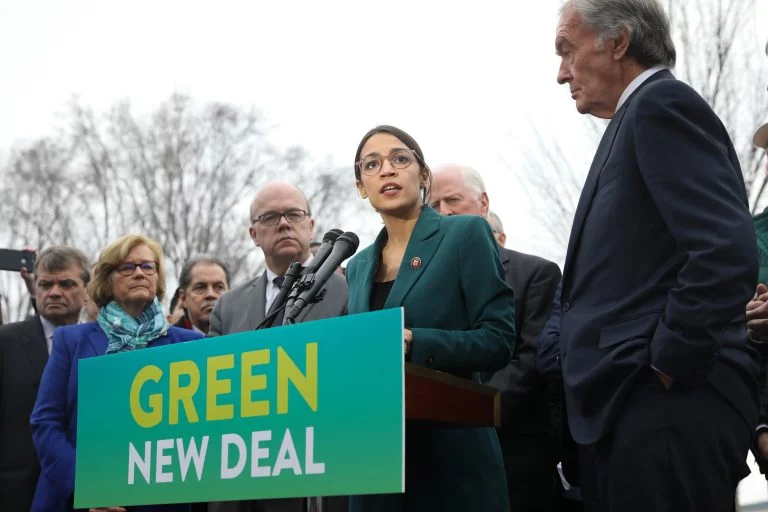In early February, American Congresswoman Alexandria Ocasio-Cortez (D-NY), flanked by veteran climate activists and supported by a host of environmental groups, stood on the steps of Congress to announce a far-reaching new effort to combat climate change.
The Green New Deal (GND), as it has come to be known, seems at first glance to be a distinctly American effort. After all, its name and contents evoke Great Depression-era legislation that, in the minds of many progressives, represented the high-water mark of social democracy in the United States.
Upon further examination, however, it is clear that the GND is not a wholly American undertaking. It fact, it was written very much in the context of Europe’s existing efforts to reduce carbon emissions and attempts to repeat Europe’s successes and learn from its failures.
The Green New Deal, explained
Given the amount of misinformation that has swirled around the GND since its unveiling—partly as a consequence of smear campaigns on the part of the Republican Party and also due to unforced errors by GND’s advocates—it is important to establish at the outset what the GND is and what it is not.
First and foremost, the GND is, for the time being, a political document – a non-binding resolution aimed at conveying a message rather than changing existing policy. What is more, officials in Ocasio-Cortez’s own Democratic Party have expressed only lukewarm support for the resolution, indicating they may not even bring it to a vote in the House. (Cynically, Republican leaders in the Senate have taken the opposite tack, signaling their desire for a vote on the GND to force Democrats to pick a side on it.) The GND is in this sense a new progressive pole in the climate debate in the United States.
That is not to say that the document should be dismissed out of the hand. Indeed, the GND likely previews where the Democratic Party’s climate policy will trend during the 2020 presidential election and the years ahead. As such, its substance is well worth consideration.
And the substance is compelling, to say the least. First, the GND calls for transformation across a host of interrelated energy policies, among them agriculture, transportation, manufacturing, electricity generation, and infrastructure. Second, it proposes policy goals that extend far beyond climate. Indeed, in some sense, the GND is economic policy disguised as climate policy, or at least riding in a sidecar alongside it, more New Deal than Green Deal. Finally, it is quiet on many policy disagreements that are sure to be wedge issues among activists in the years ahead, including nuclear power.
Atlantic crossing
The content of the GND was not, of course, developed in a vacuum. It bears the scars of the failure of previous efforts by Congress to pass progressive energy policy, such as Obama Administration-era cap-and-trade legislation. It is motivated by the urgency of the most recent IPCC report. And it speaks to the ascendency of a new generation of American policymakers and activists rising to power.
To a striking degree, however, what is also possesses is wisdom borne of the experiences of recent European experiments with climate policy.
The authors of the GND have observed what has unfolded in Europe and applying the lessons they have learned.
One such lesson is that the distributional consequences of climate policy—both real and perceived—matter. The so-called “yellow vest” protests that have gripped France in recent months illustrate this point. While the motivations of the protestors should not be oversimplified, it is apparent that the galvanizing issue was a proposed hike in fuel taxes. (It surely did not help that French President Emmanuel Macron callously dismissed the outcry by suggesting French people carpool more if they did not want to bear the extra costs).
The yellow vest protests exposed a traditional fault line in climate policy, namely that clean environments are seemingly at odds with progressive economic policy. Steps taken to reduce carbon emissions, the thinking goes, create winners and losers, and the losers are liable to be ordinary Frenchmen forced to pay more for fuel, heating, and electricity.
What is radical about the GND is that it seeks to turn this logic upside-down. Climate policy and economic policy can, according to the GND, move in lockstep with one another. To be sure, any new climate policies is liable to create winners and losers, but it need not be the case, as has been true in France, that the losers of such policies are workers struggling to make ends meet.
Bidding moderation adieu
Above all, the GND seeks to move away from the moderation that has characterized European climate policy to date. Even as the EU has staked out a leadership role on climate, its aggregate emissions have remained relatively flat in recent years. Indeed, in some cases, backsliding has occurred. Germany only recently agreed to a gradual phase-out of its coal-fired power plants, and Poland is still constructing new ones. As climate activist Greta Thunberg has pointed out, even Sweden, one of the apparent bright spots in reducing emissions, owes its progress partially to outsourcing its carbon footprint.
In view of this, the GNDs policy strategy is more far-reaching in scope. It is, first of all, borne out of the recognition that a gradualist approach is insufficient for solving our carbon problem. Rather than becoming more ambitious over time, as its proponents had hoped, progress has largely stalled out, or is at least not moving at a rate commensurate with climate science.
Second and related, the champions of the GND perceive that the politics of climate policy are shifting. Increasingly, in the United States and around the world, there is a constituency for immediate and forceful action on climate change. The transcontinental climate protests inspired by Thunberg and carried out by European schoolchildren are a harbinger of things to come. Against this backdrop, incrementalism is not simply bad policy. It is bad politics.
In the end, it should come as little surprise that climate policy is evolving in this way. Policy, after all, is usually an iterative process, and an issue area as complex and far-reaching as climate change requires multiple iterations to get it right. The relevant question is whether the lessons that the United States absorbs from Europe will help it reach the right conclusions, and in a short enough time.
Did you like it? 4.5/5 (26)








Pingback: Green New Deal aims for triple payback – Enjeux énergies et environnement
Pingback: The Green New Deal Could Eradicate Poverty | Patriots and Progressives